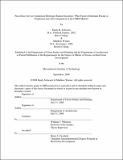Price discovery in commercial mortgage backed securities : what factors determine pricing at origination and after origination in the CMBS market
Author(s)
Schwartz, Emily R; Warner, Matthew
DownloadFull printable version (735.7Kb)
Other Contributors
Massachusetts Institute of Technology. Center for Real Estate.
Advisor
William C. Wheaton.
Terms of use
Metadata
Show full item recordAbstract
The commercial mortgage-backed securities (CMBS) market has vastly evolved over the last decade, but it remains a very private and proprietary market in comparison to other bond markets such as corporate or municipal bonds. The formation of CMBS data source providers such as Trepp and Intex in recent years has added transparency to the market, but large gaps still remain in available information for CMBS investors, particularly in the secondary trading market. This thesis examines pricing of CMBS at origination, when it is sold by the issuer, and after origination, when it is traded in the secondary market. Using a sample of AAA rated CMBS this thesis seeks to determine which factors influence price at origination and after. This thesis is essentially split into two separate studies, one examining pricing at origination and the other pricing after origination. For both parts, regression analyses were performed on fifty AAA rated securities issued from June of 2001 to December of 2006. All deal level information was provided by Trepp, while JP Morgan Chase provided historical AAA rated CMBS market information as a comparison. Secondary pricing data, based on a proprietary pricing model was also provided by Trepp. A small sample of data from actual closed transactions in the secondary market was supplied by Morgan Stanley for comparison. The results of the first part of this thesis are very similar to previous works done on the topic and show that Debt Service Coverage Ratios, geographic concentration, and property type are all important factors in determining the initial price of a CMBS issuance. The results of the price at origination study show that investors preferred seasoned CMBS deals over new issues even though the fact that overall market spreads decreased during the studies time frame. (cont.) This preference suggests that investors were more attracted to seasoned CMBS than they were to newer issuances. The second part of this thesis illustrated a similar inclination by investors to more seasoned CMBS in the secondary trading market. The authors conclude that variations do exist in the pricing of CMBS in the secondary trading market and that overall the market has significant enough transparency to incorporate different factors into investment decisions.
Description
Thesis (S.M. in Real Estate Development)--Massachusetts Institute of Technology, Dept. of Urban Studies and Planning, Center for Real Estate, 2008 [first author]; and, (S.M. in Real Estate Development)--Massachusetts Institute of Technology, Dept. of Architecture, Center for Real Estate, 2008 [second author]. Includes bibliographical references (leaf 52).
Date issued
2008Department
Massachusetts Institute of Technology. Center for Real Estate; Massachusetts Institute of Technology. Department of Architecture; Massachusetts Institute of Technology. Department of Urban Studies and PlanningPublisher
Massachusetts Institute of Technology
Keywords
Urban Studies and Planning., Architecture., Center for Real Estate.